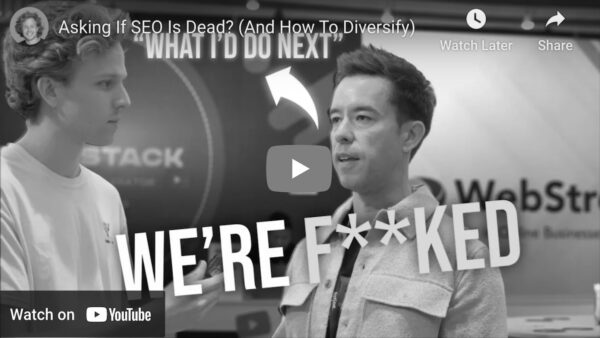TL;DR: The Easy Summary
No, SEO is not dead! At a big meeting in Vietnam, experts talked about how SEO is changing but still super important. They said we should use not only Google but also sites like Pinterest, Facebook, and YouTube to get more people to visit our websites. They also think we should be ready for how AI is changing the way we look for stuff online. So, while SEO is changing a lot, it’s still a key part of getting attention online.
The Ongoing Debate About the Relevance of SEO
As the world of SEO evolves and the impact of AI becomes more pronounced, experts find themselves in an engaging debate: is SEO finally dead?
The recent SEO Mastery Summit in Vietnam, brilliantly covered by YouTuber Jaume Ros, brought to light the insights of some of the leading minds in SEO.
Thanks to Jaume’s skillful interviews, experts like Matt Diggity, Jacky Chou, Julian Goldie, and others were able to share their knowledge on this contentious topic. They unanimously agreed: SEO is far from dead, but it’s undoubtedly evolving.
They provided compelling reasons to not just put your eggs in one basket, but to broaden your horizons to platforms like Pinterest, Facebook, YouTube, and beyond. Diversifying revenue streams and adapting to the changing world of SEO was another popular sentiment echoed throughout the summit.
State of SEO and Expert Opinions
Various SEO experts shared their opinions on the current state of SEO and whether it is dead or still relevant.
Is SEO dead? No, it’s not. However, I do think it has a limited lifespan, because how we search the internet is quite archaic.
Matt Diggity
While some professionals expressed a belief that keyword-based searching is archaic and that AI-powered search could eventually render websites obsolete, others highlighted that SEO still provides significant opportunities. Even though there could be a shift towards AI-based search results, the timeline for this shift is uncertain, with predictions varying widely from 3 to 10 years.
SEO will exist as long as there are search engines. You can count on it even if a new search engine, like Perplexity, emerges.
Jacky Chou
Interestingly, the experts emphasized the importance of diversifying the model. The shift toward relying on user-generated content and e-commerce is a successful strategy often used.
Also, brick-and-mortar businesses were recommended as partners, combining the physical presence with SEO strategies to add several layers of effectiveness to marketing efforts.
It’s not about the technique. It’s about the why. Why are we doing what we’re doing? And if you can sort that out, it doesn’t matter what update happens, you know, because we’re looking at the why of it and the bigger picture of it.
Kyle Roof
Diversification beyond Google as the primary traffic source.
SEOs suggested visiting other platforms like Pinterest, Facebook, Reddit, and YouTube for a more holistic digital marketing approach. Moreover, there was a consensus that it’s more prudent to diversify the portfolio of websites in addition to the traffic sources. The rationale is that Google’s algorithms change all the time, and this diversification helps ensure a safe, less volatile income.
The SEO professionals were unwavering about the fact that SEO is far from dead. They referenced the ongoing success of various SEOs present at the conference and noted Google’s continued dominance of the search market share. However, they acknowledged the need for adaptability when it comes to changing algorithms and updating strategies.
[Is SEO Dead?] Absolutely not. There are more opportunities than ever with SEO, especially with Google holding 88% of the market.
Julian Goldie:
Action Steps and Conclusion: Adapting SEO Strategies for the Future
To sustain traffic and revenue, they recommended focusing on creating a strong brand, optimizing on-site conversions, and exploring evergreen platforms such as YouTube.
Above all, despite the inevitable changes in methods of searching and trends, the experts agreed on the continuous need for innovation in SEO strategies.
The hands-on SEO experts in the video widely agree that SEO is not dead, but it’s changing and evolving. Below are some practical steps one can take based on their observations and recommendations:
- Diversify Traffic sources: Don’t rely solely on Google for your website traffic. Harness the power of other popular platforms like Pinterest, Facebook, Reddit, and YouTube. Each of these platforms has a substantial user-base and can be a good source of traffic with the right strategies.
- Diversify Revenue Streams: Apart from ad revenue and affiliate marketing, consider other avenues like creating digital products, or partnering with brick-and-mortar businesses for joint ventures.
- Adapt to Changing SEO Trends: The SEO landscape is continuously evolving due to changing algorithms and search methods. It’s important for businesses to stay updated with these changes and adapt their strategies.
- Focus on Brand Building: Building a robust brand can support your SEO efforts as people tend to search directly for brands they trust and business would have less reliance on Google.
- Optimize for On-Site Conversions: Generate traffic isn’t the only goal, it should also convert. Therefore, continually improve and optimize your on-site conversion rate to ensure that your SEO efforts lead to tangible returns.
- Explore Evergreen Platforms: Some platforms like YouTube are considered ‘evergreen’. YouTube content generally has a longer lifespan than other social media platforms, making them a good avenue for sustainable traffic and content distribution.
- Continuously Innovate: As industries change, you need to adapt and innovate your strategies. The moment you stop innovating, you start stagnating.
- Consider alternative site models: E-commerce sites were mentioned as persistently successful throughout SEO updates. Having an element of e-commerce to your site, or a conversion that occurs directly on your site, could help insulate against changes.
- Prepare for AI: Understand potential impacts of AI on searching habits and how this may affect the domain of SEO. Be prepared to adapt as this technology continues to evolve.
The consensus from a panel of experts at the SEO Mastery Summit in Vietnam is clear: SEO is far from dead. SEO is continuously evolving, requiring innovation and flexibility, and professionals should be prepared for the rise of AI in search methods. To mitigate risk, it’s essential to diversify traffic sources away from Google alone and explore platforms such as Pinterest, Facebook, and YouTube.
Additionally, revenue streams should be diversified and making conversions directly on a site is a recommended strategy. Strong branding is a must, as well as focusing on on-site conversions for tangible returns.
Ultimately, while the landscape is changing, SEO remains a vital component of digital marketing strategies.

